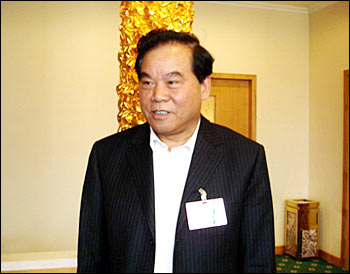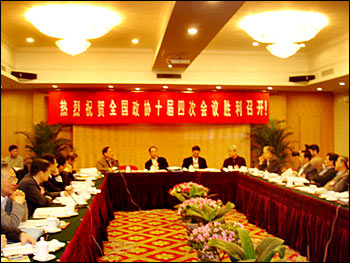| Tools: Save | Print | E-mail | Most Read |
| Scientists Welcome Boost to Sci-tech Development |
| Adjust font size: |
Premier Wen Jiabao delivered a report on the work of the government to the Fourth Plenary Session of the 10th National People's Congress (NPC) that opened in Beijing yesterday. Wen announced that the central government will allocate 71.6 billion yuan (US$8.91 billion) this year to science and technology development, representing a year-on-year increase of 19.2 percent. The announcement was warmly welcomed by scientists and specialists who are now in Beijing attending the Fourth Plenary Session of the 10th National Committee of the Chinese People's Political Consultative Conference (CPPCC), China's top advisory body. "I am very encouraged that China will establish a mechanism to ensure stable growth of government appropriation for sci-tech. I believe the growth will serve as a jump-start for China's drive toward an 'innovative country'," Huang Chunping, a CPPCC member and chief commander of rocket system of China's manned space program, told china.org.cn on Sunday.
Chen Qingquan, also a CPPCC member and an academician with CAE, said: "What impressed me most about Premier Wen's work report is that the plan is to grow GDP by 8 percent and reduce energy consumption per unit of GDP by about 4 percent. This is the first time China would be combining energy-efficiency with economic growth indices for macro-control of its economy. This is a very inspiring signal, indicating the shift in the government's development philosophy from growth-centered to people-centered. "The acute contradictions between development and resources and the environment can no longer continue. China has to increase its growth patterns and create an energy-efficient, environment-friendly society in order to maintain a sustainable development. And the state financial investment should be used to mainly support basic research, frontier research and key technology research." According to the 11th Five-Year Development Guidelines (2006-2010), which is currently being deliberated by lawmakers, China will launch a number of sci-tech projects in strategic industries such as information technology and biotechnology, and projects to address important, pressing problems in energy, resources, the environment and healthcare, as well as technologies with both military and civilian applications.
|
| Tools: Save | Print | E-mail | Most Read |
 |
| Related Stories |
| Product Directory China Search |
Country Search Hot Buys |

